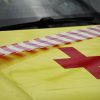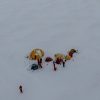 British citizens evacuated from Sudan arrive at Larnaca International Airport in Cyprus on Tuesday. Credit: Yannis Kurtoglou/Reuters
British citizens evacuated from Sudan arrive at Larnaca International Airport in Cyprus on Tuesday. Credit: Yannis Kurtoglou/Reuters
It was still dark at RAF Akroitiri Air Base in Cyprus when the evacuation mission began.
Lt. Col. Oliver Denning, commander of 40 Commando, gave a briefing on what was to come Dozens of Marines take notes with their rifles on their backs.
About 120 British troops flew to Khartoum as soon as dawn broke, solemnly marching on a Hercules C130 transport aircraft.
These men and women were now at the forefront of the most complex overseas deployment the British military has undertaken since. the fall of Kabul to the Taliban.
When they arrived at the Wadi Seidna airstrip, about 18 miles from the Sudanese capital, the 72-hour ceasefire agreed to by the Sudanese belligerents was still holding — with only sporadic reports of clashes.
This meant that at the moment the «window» for the risky mission was open.
Security in Wadi Seidna was under the control of the German military until late Tuesday night. But with the last evacuation flight out of Berlin set to leave before Wednesday, these soldiers will have to defend the perimeter of the main route out of Sudan for up to 4,000 British citizens trapped in the country.
For those sheltering at home while the fighting rages on, getting to the airport is a mission in itself. When France withdrew 500 people from Sudan on Monday, its soldiers agreed to pick up civilians from predetermined points and ferry them through the war zone. At the same time, one special forces soldier was seriously wounded.
Early Tuesday morning, the British advised citizens to stay at home unless they registered to evacuate. The situation changed in the afternoon when citizens were told to do everything possible to reach Wadi Seidna «as soon as possible».
«We can only evacuate holders of British passports and immediate family (spouses/partners and children under 18) with an existing UK entry permit,” the Foreign Office warned, saying priority would be given to the most vulnerable.
Many have accused the UK government of letting them down.
Evacuation from SudanAhzar Sholgami said her grandfather, Abdallah Sholgami, was a British citizen locked up in his house across the street from the British Embassy in Khartoum.
p>
She said her family had been unable to contact Sholgami for eight days. They also called the embassy and the foreign ministry daily, but received no help.
She said: “This is very disappointing. I have a German aunt. Three or four days ago, the German embassy came to her, took her whole family and immediately took her out.”
“We believed so much in the way the British value life.”
She said her grandfather often assured family members that if anything happened to him in Khartoum, the British would come for him.
p>
In another case, Javid Abdelmoniem's 80-year-old father turned down offers to evacuate Khartoum along with family members because he was under the impression that the UK government was going to save him.
Foreign Ministry officials asked Abdelsalam Abdelmoniyem about his medical needs, whether his bags were packed, and assured him that he would be «number one» on the evacuation list.
Assuming officials would soon help him escape the war-torn capital, Mr. Abdelmoniy, from Cambridge, has turned down offers from other family members to leave the country across the Egyptian border.
When it was announced that only British diplomats had been evacuated from Sudan, Mr. Abdelmoniy had to «scramble» to join the last of his cousins leaving the capital.
His 44-year-old son is a technical consultant for the World The Health Organization office in Malawi said: “We were devastated, shocked, speechless and [in] tears.”
He added: “This is not included. I understand that it's difficult. I understand. I even know that he has no right to be evacuated, I understand. But if they had just said, don't create that kind of expectation and then secretly evacuate.»
«Deep down I have a really painful feeling that this happened today.»
He said that even if his father had stayed, he would not have been able to get to the airfield, adding that the lack of communication with the government “increased the chances of my father coming.” do harm.»
Forced to seek help from the French
Elizabeth Boogie, a 61-year-old British teacher, said she and her colleagues were forced to turn to the French for help because they did not receive support from the UK government. She said that after a week of hiding from firefights and shelling, she was forced to go to the French embassy on the advice of other British citizens who fled during the official «stay put» advice.
Ms Bougie and her colleagues were given food and water, after which they were taken to a military airport and sent to Dijbouti.
“I did what the British government asked me to do, I called, I entered my name on the consulate’s list, I filled out their forms, but never received a personalized email, the only thing you get is a website link [ with] travel tips about Sudan,” she said. Speaking of the French authorities, Ms Bougie added: «It just shows that they were willing to take risks, unlike other governments.»
Another British citizen was robbed while trying to get to the airport .< /p>
Sam Bodley-Scott's wife said he and a group of expatriates were «scattered and searched» by paramilitary soldiers from the Rapid Support Force (RSF) in Khartoum, who took «all their money and their phones.»
She told The Times: «They were not shot by some miracle.»
Mr. Bodley-Scott then managed to get to an evacuation point organized by his employer. His house, located near the presidential palace, is at the center of the fighting. Near his territory, two tanks exploded.
«Whenever we talked, there was constant gunfire in the background,» his wife said.
One of Mr. Bodley-Scott's tanks was killed by a stray bullet after it flew out of his window and hit him in the head.
While her husband survived on boiling tap water and stocked up on porridge, his wife tried to register his presence at the Foreign Office affairs. but without success.
She added: “They did a brilliant job for the diplomatic staff — the SAS Marine arrived during the heavy fighting — I think it was amazing. But in terms of caring for other people, they were completely disinterested.”
























































Свежие комментарии